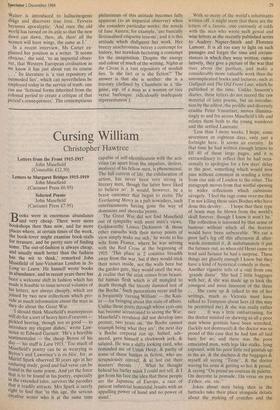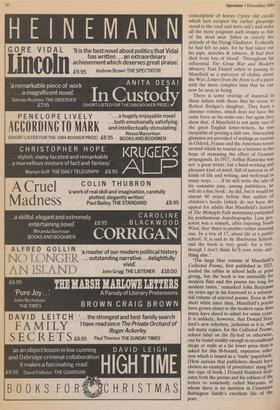Cursing William
Christopher .Hawtree
Letters from the Front 1915-1917 John Masefield (Constable £12.50) Letters to Margaret Bridges 1915-1919 John Masefield (Carcanet Press £6.95)
Books were in enormous abundance and very cheap. There were more bookshops then than now, and far more places where, at certain times of the week, the book-lover might examine book-stalls for treasure, and be pretty sure of finding some. The out-of-fashion is always cheap, and usually much better than the fashion has the wit to think,' remarked John Masefield of late-Victorian London in So Long to Learn. He himself wrote books in abundance, and in recent years there has been a welcome shift in fashion which has made it feasible to issue several volumes of his letters, not always cheaply, which are joined by two new collections which pro- vide as much information about the man as they do about the Great War.
'I should think Masefield's masterpieces will do for a sort of heavy hors d'oeuvres pickled herring, though not so good — to introduce my elegant dishes,' wrote Law- rence to Edward Garnett. 'He's a horrible sentimentalist — the cheap Byron of his day — his stuff is Lara 1913.' Too much of Masefield's poetry can be as wearying as Byron's and Lawrence's is en bloc, for, as Muriel Spark observed 30 years ago in her enduring study, good and bad verse can be found in the same poem. And yet the force that is to be found in his poetry, especially in the extended tales, survives the parodies that it readily attracts. Mrs Spark is surely right to find that 'in this age, the serious creative writer who is at the same time capable of self-identification with the acti- vities (as apart from the impulses, desires, motives) of his fellow-men, is phenomenal. The full current of life, the exhilaration of action, has never been very strong in literary men, though the latter have liked to believe so'. It would, however, be a brave customer that began to recite The Everlasting Mercy in a pub nowadays, such entertainments having gone the way of dominoes and shoveha'penny.
The Great War did not find Masefield out of sympathy with most men's views. Goldsworthy Lowes Dickinson '& those other eunuchs with their messy points of view simply make me sick,' he wrote to his wife from France, where he was serving with the Red Cross at the beginning of 1915. 'This place is 2 counties breadth away from the war, but if they would stick their noses inside, not the walls here but the garden gate, they would smell the war, & realise that the stink comes from beauti- ful human flesh which is all mangled to death through the bloody damned lust of the Boche.' Such perorations recur and he is frequently 'cursing William' — the Kais- er — for bringing about this state of affairs. Unlike those poets through whose eyes one has become accustomed to seeing the War, Masefield's revulsion did not develop into protest; two years on, 'the Boche cannot triumph being what they are'; the next day 'a Boche corporal ran up, halted, adv- anced, gave himself a clockwork jerk, & saluted. He was a shifty looking card, who reminded me of Uriah Heep, & partly of some of those butlers in fiction, who are scrupulously correct, & at last cut their masters' throats . . . What he thought behind his butler mask I could not tell, & I got from his face the idea that these people are the Japanese of Europe, a race of patient industrial homicidal Jesuits with an appalling power of hand and no power of mind.'
With so many of the world's inhabitants written off, it might seem that these are the letters of a fanatic, one curiously at odds with the man who wrote such genial and wise letters as the recently published series to Audrey - Napier-Smith and Florence Lamont. It is all too easy to light on such passages and forget the time and circum- stances in which they were written; cumu- latively, they give a picture of the war that rises above the partisan, and make a considerably more valuable work than the uncomplicated books and lectures, such as Gallipoli and The Old Front Line, which he published at the time. Unlike Sassoon's diaries, these letters do not record the raw material of later poems, but an introduc- tion by the editor, the prolific and diversely erudite Peter Vansittart, moves illumina- tingly to and fro across Masefield's life and relates them both to the young wanderer and the settled Laureate.
`Less than 3 more weeks, I hope; some seventeen or eighteen days, only just a fortnight here. It seems an eternity.' In that time he had written enough letters to fill 40 of these large pages, and it is extraordinary to reflect that he had occa- sionally to apologise for a few days' delay in the post, something which would now pass without comment in sending a letter from one side of London to the other. The paragraph moves from that wistful opening to wider reflections which culminate savagely. 'I feel the rage come over me that I'm not killing these sales Boches who have done this devilry . . . I hope that their type of brain may be blown from the world's skull forever, though I know it won't be.' The collection is leavened by that sense of humour without which all the horrors would have been unbearable. 'We cut a poor lad's leg off this afternoon & after- wards cremated it, & unfortunately it put the furnace out, so when old Henri came to tend said furnace he had a surprise. These things are ghastly enough I know but they have a kind of hysterical comedy in them.' Another vignette tells of a visit from one `grande dame'. 'She had 2 little baggages with her, & she was made up to look the youngest and most innocent of the three . . . She came up & talked to me of her writings, much as Victoria must have talked to Tennyson about hers (if this may be permitted me) & she was really rather nice . . . It was a little embarrassing, for the doctor insisted on shewing us all a poor man whose genitals have been scorched, (luckily not destroyed) & the doctor was so proud of this case that he had him all laid bare for us; and there was the poor emaciated man, with legs like stalks, lying exposed, with his poor little red genitals up in the air, & the duchess & the baggages & myself all saying "Tiens", & the doctor waving his arms & getting so hot & proud, & saying "On prend un couteau de palette. On decrotte la pomade. On verse un peu d'ether, etc. etc." ' Jokes about men being shot in the buttocks take their place alongside details about the making of crutches and the conscription of horses ('poor old crocks which had escaped the earlier gleanings stood in the road and were sad') and make all the more poignant such images as that of the dead man 'fallen in exactly the attitude of the Dying Gladiator. Evidently he had felt no pain, for he had taken out his pipe, matches & tobacco, & had then died from loss of blood'. Throughout his influential The Great War and Modern Memory Paul Fussell refers in passing to Masefield as a purveyor of clichés about the War; Letters from the Front is of a piece with the more complex man that he can now be seen as being.
There is some overlap of material in these letters with those that he wrote to Robert Bridges's daughter. They form a slimmer volume, which does not have the same force as the main one; but again they show that, if Masefield is not quite one of the great English letter-writers, he was incapable of posting a dull one. Interesting glimpses are provided of settings as various as Oxford, France and the American towns around which he toured as a lecturer in the hope of stemming the effect of German propaganda. In 1917, Arthur Ransome was not 'a great writer, but a hard-working and pleasant kind of mind, full of interest in all kinds of life and writing, and well-read in many ways . . . if he will write the tale of his romantic past, among publishers, he will do a fine book'; he did, but it would be almost 60 years before that author of children's books (which do not have the appeal for adults that Masefield's fantasy of The Midnight Folk maintains) published his posthumous Autobiography. Less pre- scient was a remark, after enjoying South Wind, that 'there is another rather amusing one, by a boy of 17, about life at a public school. It is said to be Sherborne School, and the book is very good, for a boy, though I don't think he'll ever write any- thing else.'
`The large blue volume of Masefield's Collected Poems, first published in 1923, loaded the tables in school halls at prize giving, but the book is too unwieldly for modern flats and the poems too long for modern tastes,' remarked John Betjeman six years ago in his foreword to a substan- tial volume of selected poems. Even in the short while since then, Masefield's poems have grown closer to the modern taste than many have dared to admit for some years. It is unlikely, however, that Donald Stan- ford's new selection, judicious as it is, will sell many copies, for the Collected Poems, school label on the fly-leaf or otherwise, can be found readily enough in secondhand shops or stalls at a far lower price than is asked for this ill-bound, expensive selec- tion which is issued as a `trade' paperback. (How curious that publishers should have chosen an example of prostitutes' slang for this type of book.) Donald Stanford dedi- cates both the poems and his edition of the letters to somebody called Maryana, Of whom there is no mention in Constance Babington Smith's excellent life of the poet.























































 Previous page
Previous page